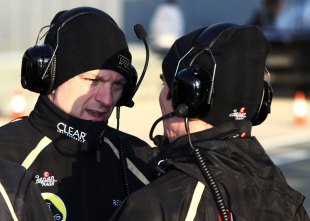- Lotus news
2014 regulations a tsunami compared to ripple of 2009 - Lotus

- Teams:
- Lotus F1
Lotus technical director James Allison says the 2009 regulation changes were relatively straightforward compared to the challenge awaiting the teams when F1 switches to V6 turbos in 2014.
Next year the sport will ditch the naturally-aspirated V8s it has been using since 2006 in order to bring in the new engine formula, forcing teams to completely rethink their cars in the process. The last major regulation change was in 2009 when aero regulations changed to limit downforce and aid overtaking, but Allison said that was nothing compared to next year's changes.
"It's going to be exciting," he said. "2009 changes were a ripple compared with the tsunami of 2014."
Most teams have set up two separate technical groups with one working on the 2013 cars and one on the 2014 cars. Allison said Lotus has had people dedicated to 2014 for several years now.
"The 2014 work started in 2011, and a long time ago in 2011 not at the end of 2011. The rules have evolved a bit since then as well so to some extent you have to change which way the rules are going. But most of the way the 2014 championship will be was laid out some time ago and you deal with a huge change like that by not leaving it to the last minute before you think about it."
The engines are currently in the last phases of development, but if the regulations remain unaltered they will only have three weeks of testing ahead of next season. Nevertheless, Allison believes that will be enough to make the cars reliable and extra testing would only benefit teams seeking more performance.
"From a performance point of view it's anyone's guess because there is a big, big change and I'm sure there will be some reshuffling of the pack competitiveness wise, but from a reliability point of view and whether you can be ready in three tests? Well, dynos are quite good at telling you whether engines are reliable and they are quite good at telling you whether gearboxes are reliable. Really the only open point will be whether you can produce a car with enough cooling, that's a fair challenge in 2014. But wind tunnels aren't bad either so most of the things to get the car on the ground and make it work are there, the testing would be about performance."

